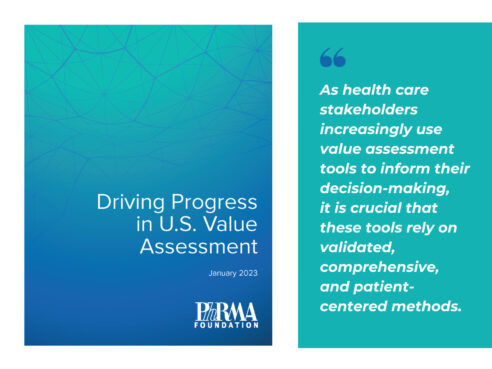Value Assessment and Health Outcomes Research

Ensuring health care decisions are guided by the best possible evidence
Every day, patients, clinicians, insurers, and other health care stakeholders make important decisions that impact patient health. It is critical that these decisions are based on rigorous scientific evidence. Value assessment and health outcomes research provide evidence about the benefits, risks, and costs of health care treatments that can help stakeholders make informed decisions.
The PhRMA Foundation Value Assessment and Health Outcomes Research (VA-HOR) Program funds researchers investigating challenges in evaluating the delivery, safety, effectiveness, and value of health care interventions.
White Paper: Driving Progress in U.S. Value Assessment
This paper reviews the U.S. value assessment landscape, identifies key challenges that may hinder the robust application of value assessment, and highlights how PhRMA Foundation-funded researchers are working toward solutions.
What is health outcomes research?
Health outcomes research evaluates the effectiveness of health care interventions, with a focus on clinical and economic outcomes that matter to patients. Using analytic tools and real-world data (e.g., medical records, insurance claims, patient surveys), health outcomes research provides insight into how health interventions work in the real world, which may not be available from randomized clinical trials. The Foundation has funded health outcomes research since 2002.
What is value assessment?
Value assessment research seeks to accurately define and quantify the value of health care interventions. However, health care stakeholders — patients, payers, providers — often have different opinions on what “value” means to them. Even patients with the same disease may value a treatment differently because of their genetics, clinical contexts, or individual preferences. To illustrate the comprehensive benefits and potential drawbacks of a health care intervention, value assessment research explores how to incorporate diverse elements of value, such as a treatment’s impact on patient and caregiver quality of life and productivity and its ability to reduce health inequities. The Foundation has funded value assessment research since 2017.
How does value assessment and health outcomes research impact patient care?
Value assessment and health outcomes research can directly impact patient care when used by health care stakeholders to inform decisions regarding patient treatment, insurance coverage, and reimbursement. When applied appropriately, value assessment and health outcomes research tools can aid in the development of a more equitable and effective health care system. On the other hand, reliance on narrow or underdeveloped methodologies can exacerbate inequalities, negatively impact individual patients, and interfere with doctor-patient decision-making. More research and better methods are needed to ensure these tools improve care without unintended consequences. The PhRMA Foundation invests in research that is rigorous and transparent and addresses the needs of all health care stakeholders — especially patients.
Value Assessment and Health Outcomes Awards
Reflecting the growing importance of value assessment and health outcomes research in informing health policy, the PhRMA Foundation has expanded its investment in this space.



Centers of Excellence in Value Assessment
The PhRMA Foundation provided funding to establish four Centers of Excellence in Value Assessment. These centers promote research, innovation, and the development of tools and partnerships that advance value-driven decision making and patient-centered care models.
